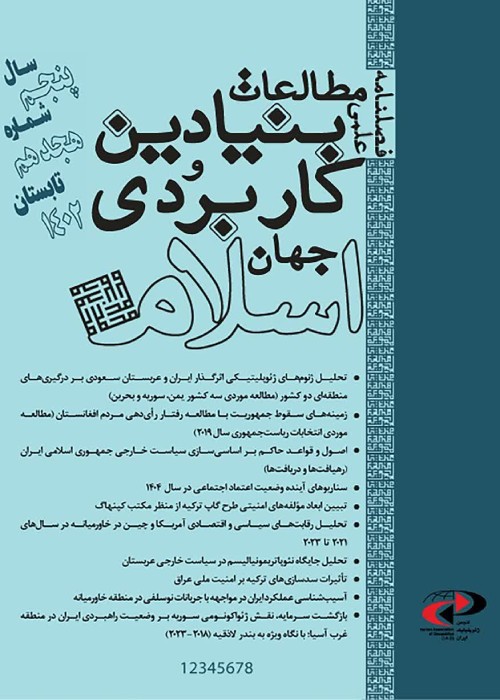Saudi Arabia's Foreign Policy Patterns Based on 2030 Vision
The combination of oil, clan, monarch, Wahhabi Islam and traditional interaction with the United States has made Saudi Arabia as a conservative country. Saudi Arabia is the only country in West Asia and North Africa that has not undergone any major coups, revolutions and important changes since its foundation in 1932.
Despite tactical changes, this country has behaved similarly at a strategic level in different historical periods, understanding this can be a great help in analyzing, explaining and researching Riyadh's foreign policy. This study has extracted the behavioral patterns of Saudi Arabia in West Asia and North Africa Based on »2030 vision« by qualitative method and descriptive-analytical approach. This research attempts to answer this question: The political, social and security events in the Arab world that began in 2011 also brought the new ruling elite to power and its internal reforms in the form of a 2030 vision, "What is the change in Saudi Arabia's foreign policy patterns?".
The conservative tradition is recognized as one of the central symbols of Saudi Arabia's politics, government, society, culture and foreign policy. Study of Saudi Arabia's foreign policy history has been always stable at the level of strategy, since its founding by King Abdulaziz in 1932 and the reign of his sons shows Riyadh's foreign policy in West Asia and North Africa, despite slight changes in level of tactics and methods.A combination of tribal tradition and the patriarchal system of government, the teachings of Wahhabism, excessive dependence on oil, and security through ties with the United States have led to the Saudi government should oppose any action, movement or theory that challenges the traditional system of the region. Riyadh's opposition to socialist currents and parties, Nasserite and Ba'athist Arab nationalism, anti-occupation resistance, revolutionary Islam and resistance, and finally to the Muslim Brotherhood can be examined in the context of Riyadh's traditional approach to maintaining the status quo in the Middle East.The developments of the Islamic Awakening and the events of 2011 are considered as a destructive move to upset the cultural, political and geopolitical balance of the region by Saudi Arabia, which was met with a reaction from Riyadh, although a military presence in Bahrain to support the Al Khalifa regime in Manama and political, financial, and weapons support to Syrian opposition groups and the lack of support for the Palestinian resistance in the 51-day war in 2012, and the 7-day war in 2014 happened during the reign of King Abdullah but Abdullah's death, King Salman's rose to power, and Salman's tenure as Minister of Defense and Provincial Office made Saudi Arabia more aggressive in establishing a new order in West Asia and Africa, from Saudi Arabia to a traditional and conservative country to an active and aggressive actor.Although several works have been published on Saudi Arabia's foreign policy and analysis of Riyadh's behavior, few studies have analyzed Riyadh's regional policies based on socio-political reforms. The study of domestic reform and its impact on Saudi Arabia's foreign policy is one of the innovations of this article. This article considers Saudi Arabia's domestic reforms as facilitators of its foreign policy. In the first part, the theoretical framework of the research, which is called eclectic neoclassic, is introduced. In the second part, while briefly introducing Saudi Arabia's Vision 2030 program, a brief reference will be made to the country's internal developments that have led to a tactical change in Riyadh's regional policy.In the third part, the socio-political reforms of Saudi Arabia, which are extracted from the Vision 2030 document and its foreign policy, are examined. Also in this section, patterns and trends in Riyadh foreign policy are studied in the following five sections. 1- Seeking supremacy in the Arabian Peninsula, 2- Hegemony in West Asia and North Africa and balancing in the region 3- Balance in relations with the United States 4- Maintaining cultural, media and political sovereignty in the Arab world and the Islamic world 5. Reducing dependence on oil and diversifying its economy.
Among the countries of West Asia and North Africa, Saudi Arabia has had the least changes in the domestic and foreign arenas, and unlike all countries in the region, it has never undergone a revolution, coup and fundamental change. combination of tribal tradition, patriarchal rule and patronage, Wahhabi teachings, rent-seeking economics, and US-based foreign security have made Riyadh a status quo. for years, "Wahhabi conservatism, the oil economy, and the security alliance with the United States" were the three main tenets of Saudi foreign policy, and foreign policy was shaped by them. Saudi Arabia is now seeking to change the Wahhabi-oil-US triangle by drawing the 2030 vision. Riyadh's regional policy should not be seen as a change in Riyadh's overall foreign strategy, in the face of the 2011 developments and its aggressive approach but as a tactical shift by Saudi Arabia to prevent a shift in the geopolitical balance of West Asia and North Africa. understanding the fixed principles and deriving patterns of Saudi Arabia's foreign policy can help to explain and accurately predict Riyadh's domestic and foreign policies.This article uses an analytical, descriptive, and historical approach based on domestic reform and the 2030 vision to conclude that Saudi Arabia's regional policies stem from Riyadh's attempt to return to the pre-2011 situation, not from Saudi revisionism.
- حق عضویت دریافتی صرف حمایت از نشریات عضو و نگهداری، تکمیل و توسعه مگیران میشود.
- پرداخت حق اشتراک و دانلود مقالات اجازه بازنشر آن در سایر رسانههای چاپی و دیجیتال را به کاربر نمیدهد.


